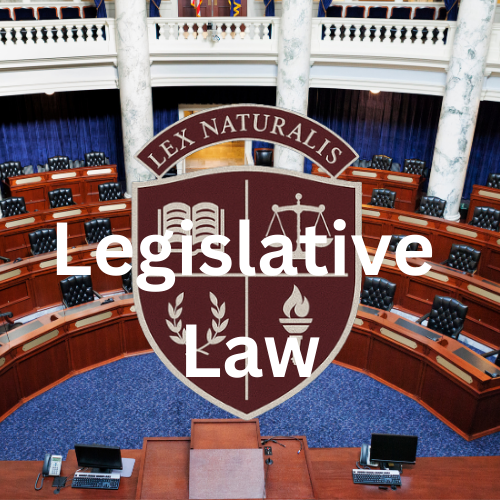Toward Constitutional Libertarianism
- Dr. Byron Gillory
- Aug 14
- 4 min read

The inadequacies of these paradigms invite a fresh synthesis—one that grounds constitutional interpretation in natural law while affirming the primacy of individual liberty within a limited constitutional framework. This is the essence of Constitutional Libertarianism.
Constitutional Libertarianism begins with three axioms:
Natural Rights as Foundational: Individual rights preexist government and are discoverable through reason and moral reflection. The Constitution does not grant these rights but recognizes and secures them.
Government as Fiduciary: Public officials are trustees of delegated powers, strictly limited to protecting natural rights. All other exercises of power are ultra vires.
Liberty as Presumption: In cases of interpretive doubt, the presumption must favor liberty and against state coercion—a reversal of modern judicial deference.
This paradigm does not reject constitutional text; rather, it interprets the text in light of natural law principles. It neither idolizes historical intentions nor succumbs to relativistic evolution. Instead, it treats the Constitution as a charter of liberty grounded in universal truths.
As Blackstone himself observed, “This law of nature, being coeval with mankind and dictated by God himself, is of course superior in obligation to any other. It is binding over all the globe, in all countries, and at all times: no human laws are of any validity, if contrary to this; and such of them as are valid derive all their force, and all their authority, mediately or immediately, from this original.” (Commentaries, I.41)
The Enduring Relevance of Natural Law
Modern legal scholarship often treats natural law as a relic—an antiquated philosophy surpassed by legal positivism or pragmatic constitutionalism. Yet the resurgence of interest in moral realism and fundamental rights signals that natural law remains not only relevant but indispensable. At its core, natural law posits that law is not merely a human artifact but a reflection of objective moral order, discernible through reason and binding upon rulers and ruled alike.
This principle, articulated by classical thinkers such as Cicero and later refined by Thomas Aquinas, forms the bedrock of the Western legal tradition. Cicero’s claim that “true law is right reason in agreement with nature” (De Republica, III.22) resonates profoundly within American constitutionalism, whose framers grounded their rebellion against British authority in “the Laws of Nature and of Nature’s God” (Declaration of Independence, 1776). Such language was not ornamental rhetoric; it was a deliberate invocation of a moral order superior to human statutes.
Contemporary positivists dismiss this appeal to nature as metaphysical speculation. Yet history demonstrates that every enduring legal system implicitly relies on moral axioms—principles of fairness, proportionality, and human dignity—whether acknowledged or not. As Lon Fuller argued in The Morality of Law (1964), even procedural legality presupposes moral norms, such as consistency and intelligibility. To deny the moral foundation of law is to render legal obligation indistinguishable from brute force.
Blackstone’s Synthesis: Divine and Human Law
The Commentaries on the Laws of England (1765–1769) by William Blackstone epitomize the classical synthesis of natural and positive law. Blackstone famously declared:
“This law of nature, being coeval with mankind and dictated by God himself, is of course superior in obligation to any other. It is binding over all the globe, in all countries, and at all times: no human laws are of any validity, if contrary to this; and such of them as are valid derive all their force, and all their authority, mediately or immediately, from this original.” (Commentaries, Book I, Chapter II)
For Blackstone, human laws derive legitimacy only insofar as they conform to natural and divine law. This hierarchical view rejects the positivist separation thesis: statutes that contravene natural justice are not merely immoral—they are void. The American founding generation absorbed this doctrine deeply. James Wilson, signer of the Declaration and framer of the Constitution, echoed Blackstone in his Lectures on Law (1791): “The law of nature and the law of revelation are both divine; they flow, though in different channels, from the same adorable source.”
It is no coincidence that early American jurists, from Chief Justice John Jay to Justice Joseph Story, routinely invoked natural law principles when interpreting the Constitution. Even Marbury v. Madison (1803), while establishing judicial review, implicitly assumed a higher law: the Constitution itself was supreme because it expressed the people’s enduring will, rooted in natural rights.
The Decline of Natural Law in Modern Jurisprudence
Despite its foundational role, natural law suffered a dramatic decline in twentieth-century legal thought. The ascendancy of legal realism and positivism marginalized moral reasoning in constitutional adjudication. Justice Oliver Wendell Holmes Jr., in The Common Law (1881), famously declared, “The life of the law has not been logic; it has been experience.” This aphorism, often celebrated, masked a profound shift: from principle to pragmatism, from universal rights to contingent social policies.
This trend accelerated during the New Deal era, as the Supreme Court abandoned substantive protections for economic liberty (notably in West Coast Hotel v. Parrish, 300 U.S. 379 [1937]) and embraced expansive regulatory authority under the Commerce Clause (Wickard v. Filburn, 317 U.S. 111 [1942]). The Lochner era’s defense of freedom of contract—once rooted in natural rights reasoning—was derided as judicial activism. In its place arose a deferential posture toward legislative majorities, culminating in the infamous “rational basis test.”
By the mid-twentieth century, constitutional discourse was bifurcated: civil rights (speech, due process, privacy) received heightened judicial protection, while economic liberties were relegated to minimal scrutiny. This bifurcation, lacking principled justification, reflects the eclipse of natural law: absent a coherent moral framework, the Court arbitrarily privileges some liberties over others.

Comments